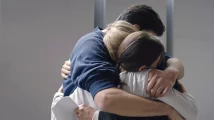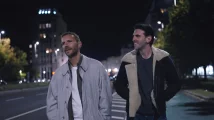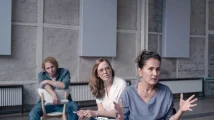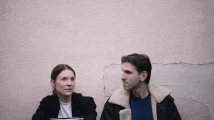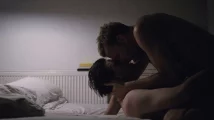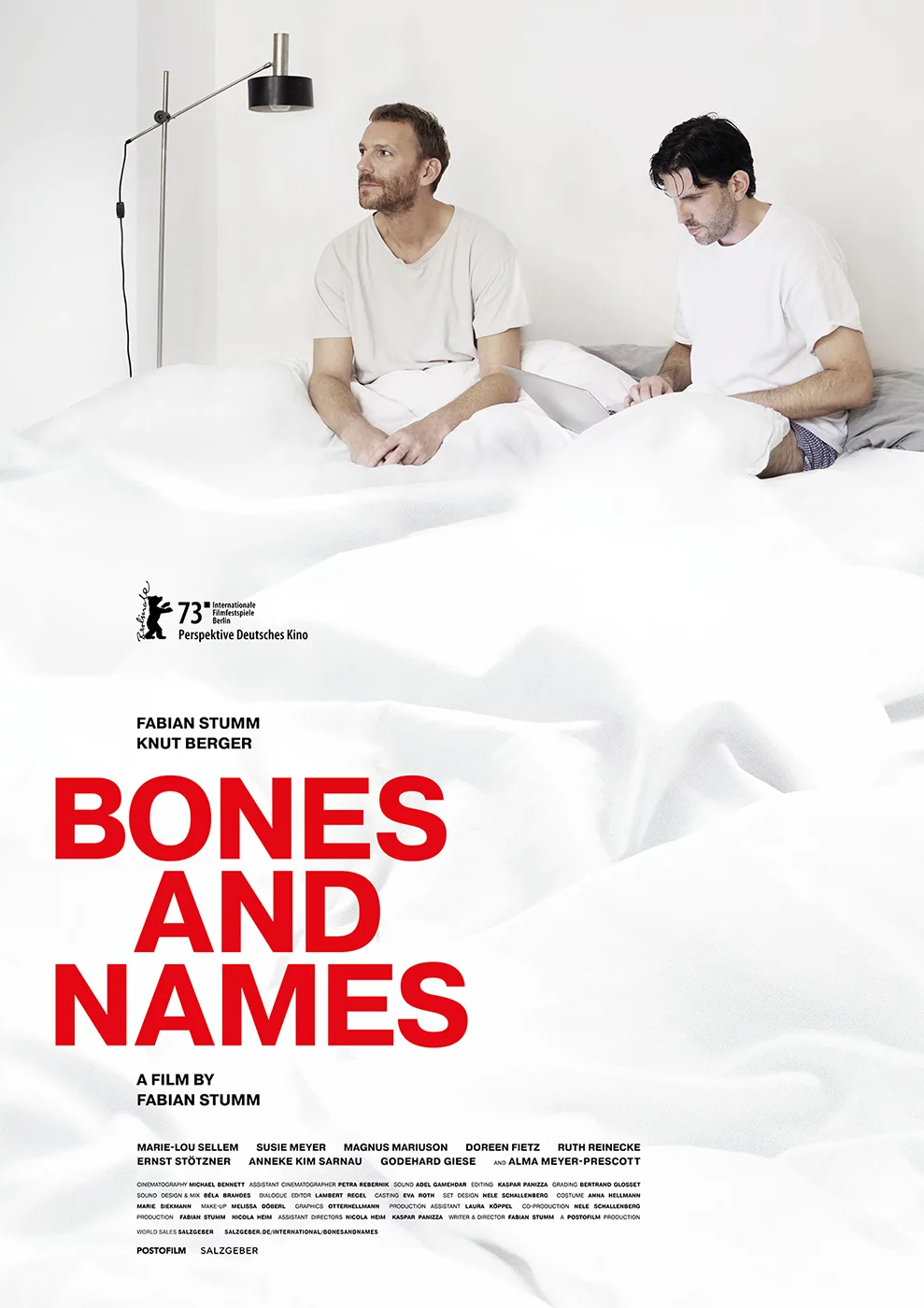
International
Bones and Names
a film by Fabian Stumm
Germany 2023, 104 minutes, German and French
subtitles: English, German
Bones and Names
Boris and Jonathan have been a couple for many years. But their relationship has reached a point where they might as well spend their evenings together separately: One lies in bed reading, the other works at a desk in the next room. While Boris immerses himself deeper and deeper into rehearsals for a new film with an ambitious director, Jonathan tries to redefine his voice as a writer. Ghosting through these days of wrestling with distance, closeness, trust, desire and fear of loss is Jonathans’ young niece Josie, who is trying out idiosyncratic ways to deal with the approaching end of her childhood.
„Bones and Names“, the feature-length debut of Fabian Stumm, portrays a group of people searching for their place in life. A sensitive and humorous reflection on the dissonances in relationships that connect and distance us from each other.
Trailer
Interview
Director Fabian Stumm talks about his film
You’ve been working as an actor for many years. How did you get into writing and directing?
I wrote a lot as a child. Short stories, plays or radio plays. Later I discovered acting. In recent years, the need to tell my own stories became stronger. Certainly out of a hunger to have greater influence on material and more artistic control. But first and foremost, I think, to give form to the things going on in my mind. The path to directing then came quite organically. I grew up with films and cinema, which has always occupied the largest space in my life. At drama school in New York, I often skipped classes because I wanted to catch a matinée at the cinema. I remember watching Isabelle Huppert in „The Piano Teacher“ by Michael Haneke several times in one week. I still feel you can learn more in the cinema than in most classes. To this day, I watch films that move me over and over again to understand how they work.
How did the idea for „Bones and Names“ come about?
After the end of my last relationship, I felt for a while that a part of me had been submerged. Joan Didion once wrote: „Remember what it was to be me. That is always the point.“ That speaks to me. I wanted to come to terms with the pillars that make up my life. To remember what is good and stable about it, what scares me or makes me sad, and why. But I only really became aware of that in retrospect, before and during the shoot there was only this inner motor that drove me. In a sense, the film reconciled and reunited me with myself.
The film has a wonderful cast. What was the casting process?
I developed most of the roles for the respective actors and actresses. It’s great when you already have a voice in your ear while writing, knowing its rhythm and composing the dialogues accordingly. At the same time, it’s fun to consciously let the actors do and say things you’re not used to hearing from them and let them surprise you. The collaboration with the casting agent Eva Roth was also important. I value her eye and her intuition, and together we cast the parts I consciously wanted to be open about.
Tell us something about your ensemble. How was working with your co- star Knut Berger?
Knut was on board from the very first idea. Because at the core I was interested in telling a relationship story between two men, it was essential to have a great deal of trust in each other. Knut and I have been close friends for many years and he immediately understood the script and his character on a deep level. His enthusiasm and love for the project really encouraged and sustained me. I am very proud of his work in the film.
How did Marie-Lou Sellem become part of the project?
Marie-Lou and I met years ago on a shoot. I immediately saw her in the role of Jeanne, a French director who is filming her own story. I love Marie-Lou’s humor, her curiosity, her focus. She has great power in her acting. It was virtuosic how she was able to shuttle between the two languages, her role and herself. She impressed me on many levels.
Anneke Kim Sarnau has only one scene in the film but she leaves a lasting impression.
Anneke is a very important actress for me. We have become close friends over the years but long before we knew each other her films accompanied me. I will never forget her in „Hope Dies Last“, where she has moments that are burned into my memory forever. I didn’t want anyone else for that scene, which is very close to my heart, and when we were done with it, there wasn’t a dry eye on the
set.
And little Josie, played by Alma Meyer-Prescott?
Alma is the daughter of Susie Meyer, who I cast in the role of Carla. I’ve known her and her little brother since the moment they were born because I was there for the births. So Alma is family to me. On set, I was sometimes asked which character I identified with the most, and my answer was always Josie. I’m sure that’s because of the autobiographical elements of the role – but I also feel reminded of my own childhood in the way Alma plays her. I was very touched to see her on set with so much joy and openness.
Susie Meyer, who was heavily pregnant with her second child in your last film „Daniel“, doesn’t play the single mother this time.
That was a deliberate play on reality. Susie is in fact a single mother, and that’s a theme that concerns me a lot. This absence of men who are fathers but don’t get involved. I wanted to see Susie in the role of the actress Carla, who can keep working also because she has a partner who supports her at home. On set we understood each other without many words, usually just a look was enough and she knew what I meant. I think she’s unique in front of the camera.
How was it for you to be your own director and direct yourself?
Liberating. I love working with other filmmakers and really like fitting into their vision. But even when I was acting in my short films, I noticed the instance I want to please falling away. I want to play a role the way I feel it, but at the same time I want to make the director happy. That can sometimes be a balancing act. As Boris, I was so focused on the work of the other actors that I played very instinctively, without making any plans, and was always in the moment. That was beneficial for me and my acting. I find it incredibly exciting to direct while acting, because you can influence and guide your scene partners in a very unobtrusive but direct way.
Were there many rehearsals in advance?
No. I met with the individual groups and talked intensively about the script and the characters. Ruth Reinecke and Ernst Stötzner, for example, I brought together with their film children Knut Berger and Doreen Fietz. They talked for hours about their own experiences with the themes of the film. At the end, they read the scene once and it was all there. While shooting, I was stunned at how truthfully they played their long interview scene. Their first take was also the one we used in the film. I don’t really like rehearsing on set. I like to shoot right away and find moments in front of the camera that you couldn’t possibly recreate afterwards. Little accidents, insecurities, spontaneous reactions – even
though we stuck very closely to the book and the dialogues, we kept a few of those in the film. That makes it more human.
Tell us about the visual language of the film.
While writing the script, I knew very clearly what I wanted the scenes to look like. I drew a detailed storyboard, which I rehearsed and photographed with my cinematographer Michael Bennett in the various locations before shooting. We were then able to communicate wonderfully during the shoot via the photographic storyboard that came out of that, because we didn’t have to go searching in the locations. Through his experience as a photographer, he has an good feel for spaces and architecture, and we share a passion for clear lines and graphic settings. So that was a very harmonious collaboration.
You shot without funding. What was the process behind that?
I like working with people I know, but also enjoy building a network of new people. I’ve known co-producer Nicola Heim since drama school. She’s one of the first to read my ideas and is always enthusiastic when it comes to a new project. My editor Kaspar Panizza, on the other hand, is a young filmmaker I met for this film. From our first meeting, I knew he would be the right person for the job. He brought something special to the film. Nicola and I decided early on to make the film with our own money without funding. The urge to tell the story as too strong to wait months for financial support, so we did everything ourselves. We were able to build great team that believed very much in the film and worked on provision with small fees. Of course, that’s not the ideal and it’s not sustainable in the long run. Still, I don’t think good material necessarily needs huge budgets. I would find it commendable and important if independent, more intimate film projects could also have more options in financing.
Which artists influence you in your work?
There are many. Claude Sautet, Maurice Pialat, Chantal Akerman, Robert Altman, Claude Goretta, Olivier Assayas, Helmut Käutner and André Téchiné are just a few of the filmmakers who mean a lot to me. In literature, they are Annie Ernaux, Heinrich Böll or Joan Didion. The paintings of Nicolas de Staël. And Taylor Swift has been a reference for me for years. As a storyteller, I find her immensely talented. I’m moved by the fact that she seems to reveal a lot about herself in her songs. That’s what every work is about for me: connecting with life and the people around you, whatever the form.
Biographies
FABIAN STUMM (director, writer, producer, Boris), born 1981 in Koblenz, studied acting at the Lee Strasberg Theatre & Film Institute New York. He has appeared on stage at HAU Berlin, Münchner Kammerspiele, Volksbühne Berlin, The Kitchen New York and Tate Modern London, among others. His film work includes „Lore“ by Cate Shortland, „Bela Kiss: Prologue“ by Lucien Förstner, „Precious Ivie“ by Sarah Blaßkiewitz, and the Grimme-Award nominated series „Druck“.
He made his directorial debut in 2020 with the short film „Bruxelles“. In 2022, his second film „Daniel“ was awarded Best Mid-Length Film at the Achtung Berlin Festival. „Bones and Names“ is his feature film debut.
2020
„Bruxelles“ (short film)
2021
„Daniel“ (mid-length film)
2023
„Bones and Names“
KNUT BERGER (Jonathan) studied acting at the UdK Berlin. On stage he appeared at Schaubühne Berlin, Maxim Gorki Theater and Volkstheater Vienna, among others. He played his first lead role in „Walk on water“ by Eytan Fox. Other film and TV work included „Wir“ by Martin Gypkens, „Jerichow“ by Christian Petzold, „No Hard Feelings“ by Faraz Shariat, „Deutschland 86“ by Arne Feldhusen, „We Might As Well Be Dead“ by Natalia Sinelnikova, „Das weiße Schweigen“ by Esther Gronenborn and „Oh Herll“ by Simon Ostermann and Lisa Miller.
MARIE-LOU SELLEM (Jeanne) studied acting at the Folkwang Hochschule Essen. Her stage credits include Volksbühne Berlin, Schauspiel Köln, Deutsches Theater and the Salzburg Festival. She has also appeared in a variety of film and TV productions and was nominated for the German Film Award for Best Supporting Actress in 2002. She was seen in „Winter Sleeper“ by Tom Tykwer, „Mareseille“ by Angela Schanelec, „Exit Marrakesch“ by Caroline Link, „Casting“ by Nicolas Wackerbarth, „Charlie’s Angels“ by Elizabeth Banks and „TÁR“ by Todd Field. Most recently she was part of „Verbrannte Erde“ by Thomas Arslan.
